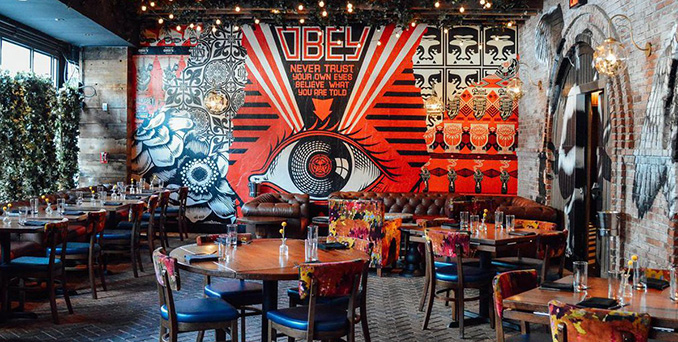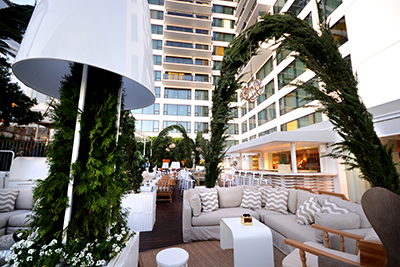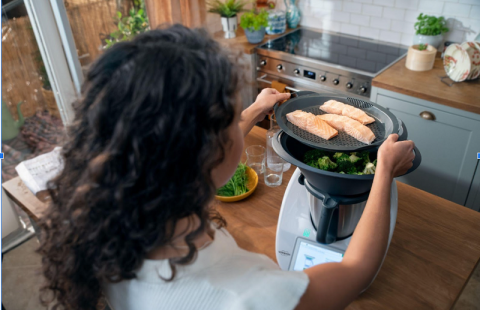By Craig Carlson, the owner of two American diners in Paris and the author of the memoir, Let Them Eat Pancakes.
One year ago this week, the French government gave me just four hours to completely shut down my two restaurants. The official announcement came on a Saturday night at 8pm. All restaurants and bars in the country had to close down by midnight. Today as I write this, France is heading toward a third lockdown, which could be the tipping point for Mom and Pop establishments like mine.
Little Caesars to Add 50 Units in Portland & Seattle by 2026
Looking back on that first lockdown last year, it couldn’t have happened at a worse time. It was the night before our Sunday brunch, our busiest day. The kitchen had prepped for 300 covers/meals. Correction. 350+ covers. That’s because we had just hired a new “commis” (assistant cook), and the head chef had decided to give him beaucoup de prep so he’d be ready to replace the previous commis who had just abandoned his post without any warning.
The next morning I had to figure out a way to salvage thousands of Euros worth of food without wasting any of it. First stop: charities and food banks. My husband Julien searched online, but logistically there wasn’t enough time to organize a pick up before the official lockdown of noon on Monday, the following day. Making matters worse, no one had any idea how long le confinement was going to last. Some said weeks. Others said months.
The second option for saving as much perishable food as possible: the staff. Julien sent out a group text message to all employees saying to come with their Tupperware to either Breakfast in America diner (there were two) and grab whatever they could. But there was so much panic in the Parisian air, only four of the sixteen staff members at BIA #1 ventured out. (The second diner fared much better, but still it did not put a dent in the amount of food we needed to give away.)
I felt completely devastated as I dumped dozens of large containers full of bacon, ham steaks, sausages, seasoned hamburger meat, grated and sliced cheese, hundreds of fresh eggs, and mounds of sliced and diced vegetables into our trash bins. (I decided to leave a few trays of eggs by the front door, hoping passersby would take them.)
As the March sun set early on the horizon, Julien and I gathered as much food as we could carry, then hopped on our bikes for the short ride home that never felt so long. The scene as we crossed the Seine onto Ile St. Louis was straight out of a science fiction movie. The ancient 16th century island was dark and deserted, its inhabitants replaced by piles of charcuterie (long sticks of dried sausage) dumped in haste onto the sidewalk in front of each café.
By noon the next day – confinement day – every finely carved wooden door in Paris slammed shut for God knew how long. I stared out the window of our apartment in the Marais. With its narrow, medieval streets and tilted buildings, it was easy to imagine what the City of Light was like hundreds of years earlier, when pandemics were called plagues. And just like in biblical times, for the next 40 days and forty nights, I did not stick a toe outside. Instead, I would open the window in our place and wait for the sun to peak over the rooftops for a few minutes and shower me vitamin D. As spring barreled toward summer, each day the sun would rise a little higher until it was above the rooftops, flooding our little place for up to two hours with bright nurturing light.
Like a seed that sprouts when it’s hit with a drop of water and a ray of sunshine, Julien’s face beamed as he turned to me and said over breakfast, “Hey, why don’t we open BIA #2 for takeout and delivery. We have the right to do it. I looked it up. We just have to get a special attestation.” (An official French document.)
And so it was that at the beginning of May, Breakfast in America #2 — along with a pizza shop on rue St. Paul — became the first and only restaurants in our quartier to offer hot food to-go. Naturally, business started off very slowly; it was hard to wrangle in Parisians who were only allowed to go outside for an hour at a time to purchase essentials (such as baguettes and cigarettes) – or to jog within a kilometer of their place of residence. The locals would trot by and wave, occasionally stopping for a second to say how happy they were to see us. “You bring life into the neighborhood!” they’d say as they raced off, promising to come back another time to actually buy something.
As the weeks dragged on, business slowly began to pick up. Five to ten covers a day turned into as many as fifty to sixty. Sure, it was a fraction of our usual numbers, but still enough to motivate Julien and me to get out of bed every morning and slap on our happy faces to present to the public.
Then one day in early June, with the curve bending down just enough, the French government made a big announcement: They would allow restaurants and bars to open – but for outside service only. Julien and I were ecstatic. There hadn’t been a drop of rain since April, so I took for granted that there would be sunshine. Big mistake for Paris. Sure enough, just as Julien and I were happily setting up rows of tables and chairs onto the sidewalk, Paris was drenched with non-stop downpours. I along with the other restaurateurs and café owners in my quartier stood in our doorways, raindrops splattering onto our faces, blending with our tears.
Then one day, halleluiah, the clouds cleared! Literally and figuratively. Perhaps inspired by the newest development in New York and other big cities around the world, Président Macron proclaimed that restaurants and cafés could now take over the parking spaces in front of their establishments and turn them into outdoor terraces!
Read Also: Little Caesars Targets 50 Units in Portland and Seattle by 2026
Thankfully, I had a French husband who was a pro at filling out French forms. Before you knew it, he was printing up the official document that granted us the right to set up… drumroll, please:
La Terrasse Éphémère… The Ephemeral Terrace.
I stared at that odd word, éphémère, which I hadn’t heard or used in decades. At that moment, my mind went back to my college French class. I was reading Le Petit Prince by Saint-Exupéry when I came upon this exchange between the title character and a solitary Geologist who was trying to figure out a way to map out his tiny planet without leaving his desk.
“What does that mean — ‘ephemeral’?” the Little Prince asked the old man.
“It means, ‘which is in danger of speedy disappearance,’” came the old man’s reply.
Perhaps because I had learned the word in the context of the magical, mystical world of The Little Prince, ephemeral always had an existential – dare I say, spiritual connotation for me. As in “Life is ephemeral.” Or “This too shall pass.”
Ironically, some 40 years later, ephemeral turned out to be the perfect word to describe my situation – and not just for a measly outdoor terrace, but for the whole damn business itself. I was reminded of Rick from the classic film, Casablanca. Like me, he was a restaurant owner who was constantly dangling on the razor’s edge. When the French authorities shut down his Café Américain, he confides to his right hand man that he only has enough cash reserve to last two weeks. Two weeks before Bogart goes out of business! And his place was packed every night!
There were a couple other reasons why éphémère was such a fitting appellation for my diner. First, the city of Paris let us set up the terrace in the parking spaces in front of the diner until 10pm (we closed at 11pm). After that, we weren’t allowed to keep our tables and chairs outside at night, so we had to drag them back inside, which, of course meant that the next morning, cars would be parked in the very same spots that we needed to stay in business. Even if we set up barriers – like planters or emergency tape – impatient Parisiens would move them just enough to wedge in their Renaults.
So each morning the moment Julien and I arrived at work, we’d have to be on constant alert should one of the parked spaces free up. Then we had – at most – a ten second window to run outside and hold onto the spot before a car would whip around the corner and try to grab it first.
Then there were the denouncing neighbors. We’d barely profited from our terrasse éphémère, when an official from city hall waltzed into the diner one afternoon and flashed his badge. “We’ve had a complaint,” he said ever so coolly.
I crouched down in the red banquette, trying to become invisible as I let Julien deal with the frightening fonctionnaire. The official held up a digital device and showed Julien a picture that appeared to have been taken from the third or fourth floor window of the building in front of us.
“As I’m sure you’re aware, Monsieur, the law clearly states that you may only use the ephemeral terrace until 10pm. This picture was taken by your neighbor at 10:07pm. As you can see, there are still customers seated at one of your tables.”
“Yes, Monsieur,” Julien said, “but if you look more closely, you’ll see they’re finishing up their desserts. They left shortly thereafter.”
“10pm means 10pm,” the mayor’s minion said with a sneer. “I’ll give you a warning this time. But from now on, at 9:45, start moving your customers onto the sidewalk. Vous comprenez?”
Julien nodded. I peaked over the booth and looked outside the window. Mere inches separated the terrace from the sidewalk. How did such a short distance change anything, I wondered. On top of that, we were in the middle of a goddamn pandemic. How could that evil, neighbor/collaborator be so, well… evil?
After the fonctionnaire left, Julien and I trotted over to see our neighbor whose café was also in the photo – only his terrasse éphémère was completely full at 10:07pm.
“Yeah, yeah, whatever,” he shrugged. Turns out the owner had come to the conclusion that it was worth the occasional 135 Euro ticket to keep his money-making, business-saving customers happily seated and shitfaced until the bar closed at 2am.
Up until the end of June, Julien, the cook and I were the only staff members who came to BIA to work. But on June 28th, the French government finally said what we were waiting to hear: customers were now permitted to come inside the diner to dine (but with very limited capacity).
“Time to call the troops back into work!” I declared to Julien.
But much to my surprise, several of the wait staff (most of whom were students and not French) had conveniently “forgotten” to tell us that they had left the country months earlier, even though they had been collecting their full unemployment benefits from France the whole time. Thanks for the steady paycheck! See ya!
Julien and I had no choice but to hire new employees – and at great risk; there was no way to know if another wave of the pandemic would strike. Therefore, we had to be extra careful not to let new hires go past their trial period. If so, they would become permanent lifelong employees, meaning it would be nearly impossible to let them go, especially if their trial period ended during a confinement. Of course, being France there was also a penalty for not keeping an employee past their trial period in normal conditions. It’s called: “Une prime de précarité” – literally a precarity bonus.
Since the word précarité was not in The Little Prince, I had to look it up.
Precarity: Dependent on chance. Uncertain.
Which was worse? Ephemeral or precarious? For a restaurateur like me, weren’t they one and the same?
Two weeks. That’s all Rick had before going under. Two weeks.
People often ask why I can’t relax. I ask myself that a lot, too. Rick was always cool. He never broke a sweat. Why couldn’t I be more like him? Oh, right. He’s fictional.
But my café owner/neighbor was real. That didn’t stop him from being totally sang froid – just like Rick. Precarious schmacarious! My confrère decided to close his café for the entire month of August. To go “en vacances.” While he was gone, Julien and I were happy to siphon off his customers; it helped bring the month up to (almost) pre-plague levels.
“Feeling better now, chéri?” Julien said, putting his arm around me as we surveyed our packed ephemeral terrace that had a Fiat wedged between tables.
“Yeah, yeah, sure, sure,” I lied.
As August rolled into September, and the days got shorter and the nights cooler, fewer customers wanted to take advantage of our lovely terrasse éphémère, even though it was now decorated with a beautiful mixture of real and plastic plants. (You had to touch them to see which was which.) Since it was empty outside, we had no choice but to cram as many customers inside as we legally could.
By October, as Julien and I were hanging up bouncing bats, ghastly goblins and slinky skeletons from the light fixtures inside the diner, I tried to ignore the number of new daily cases of Covid, which were reported online every night at 9pm. Lately, there’d been a bend in the curve. But not in the right direction.
As the numbers spiked, Parisians on the street began to speculate on what the government would do next. During times like these, Paris felt like a small village. Everyone gossiped. And such gossip was often surprisingly spot on.
“Macron might order bars and restos to close earlier in the day,” my café owner/ neighbor said. “Or he might impose a temporary curfew. But he’ll never declare a second lockdown. He was a banker. He knows that shutting down again will completely destroy what’s left of France’s economy.”
The café owner was half right. Two days before Halloween, Macron declared another lockdown – but for cafés, bars and restaurants only. However, this time we got a 48-hour notice. That’s twelve times better than the first time.
Being old pros with lockdowns, Julien and I were able to make sure no food was wasted at Breakfast in America. As with the first confinement, we were allowed to serve take-out and delivery only, thus using up all our supplies before they went bad.
It’s now five months later. As I write this, storm clouds are brewing on the horizon once again. Despite a nationwide 6pm curfew, the number of new Corona virus cases remains stubbornly high, refusing to bend. Gossip is growing on the streets that the government is about to declare a third lockdown.
And here I am, almost exactly a year to the day since the first lockdown. I go through my morning routine, dragging a table to the front door of the diner, blocking the entrance so that customers can’t come in but can order out.
I glance at the crinkly, weathered “authorization sheet” for my ephemeral terrace that’s taped to the window. All of our outdoor tables and chairs are piled way up high in the next room, dangling ever so precariously. They gather dust as the last remaining drops of my company’s cash flow dry up like desert rain that evaporates the moment the clouds clear, leaving mounds of dry sand that sift through your hands like a dream.
Read Also: Little Caesars Targets 50 Units in Portland and Seattle by 2026
How ephemeral are our best laid plans. How precarious life is from one day to the next.
Perhaps I think too much during these trying times. My inner philosopher both comforts and annoys me. Even with limited financial help from the French government, I have no idea if Breakfast in America will survive this particular plague. But to help put things in perspective, I think of the woeful wisdom of my fellow restaurateur who was on the brink of bankruptcy himself as war raged on just outside the gates of a mythical city called Casablanca:
It doesn’t take much to see that the problems of two little diners don’t add up to a hill of beans in this crazy world.
I wish I could be as noble as Rick. But Breakfast in America was my baby. And I wanted my baby to make it through these crazy times.








